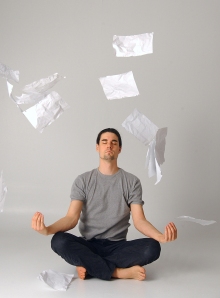Meditation, once considered an alternative activity for the nonconformists of this world, is slowly becoming more mainstream. Why are large companies, executives, attorneys, and people from all different walks of life taking-up the practice of meditation?
Simply put: because it works! It’s more than just a fad; it is a scientifically proven stress reliever that really works – otherwise, why would so many people from so many different backgrounds be adopting the practice?
Meditation, Defined?
 According to MedicineNet.com, meditation is a self-directed practice that relieves stress, calms the mind and relaxes the body. These practices originated as Eastern religious practices in China, Japan and India, but are now practiced throughout the world.
According to MedicineNet.com, meditation is a self-directed practice that relieves stress, calms the mind and relaxes the body. These practices originated as Eastern religious practices in China, Japan and India, but are now practiced throughout the world.
Up until recently, these practices have almost always been related to religious beliefs, however, there are also many health benefits that have long been associated with meditation techniques of all types; primarily, these techniques are an effective way of reducing stress.
Meditation clears the mind, relieves stress and allows the body to relax, if even for a few minutes. This small time frame set aside to relax, allows a person to relieve stress and offers more mind flexibility throughout the day.
Practice Makes Perfect
As in all natural and healthy habits, meditation takes daily practice to be effective. However, professionals, attorneys and people from all walks of life, often find putting aside the time to meditate somewhat difficult.
Time is limited, and finding the right meditating location becomes a real issue.
Finding the time and the place to get away from it all and practice meditative techniques can be quite challenging. Some of the larger, more alternative, corporations now offer special meditation rooms for this purpose, but the movement seems to be growing too fast for the average corporate management team to make proper arrangements for the practice.
Compensate
Working meditation into a daily routine doesn’t require special equipment or a specific room. It doesn’t require a person to go home in the middle of the day to find that quiet meditative place. Meditation can be performed during the last 5 to 15 minutes of a lunch break, on a 15-minute break or even a special 5 minutes of quiet time behind a desk.
Where to Look
Find a noiseless location somewhere in the office. If there is no peaceful place at the office go to the car, visit a nearby park, green area, sit upon a bench outside the building, under a tree, or even the building rooftop will do.
If you can’t get out of the office, investing in some noise-canceling headphones or ear plugs is another option.
The Process
Deeper Meditation suggests that office meditation techniques can be implemented inconspicuously into the workday. It only takes a few minutes a few times a day to build up a profound inner peace in a professional’s daily work routine.
Even if you’re busy, decide to use the same time every day to meditate. For professionals working at home, set an alarm clock so it goes off at the same time. Leave the computer, phone and any other technical paraphernalia behind.
Turn devices off to be on the safe side to ensure there are no interruptions during the meditation.
Start each meditative session with deep breathing. “Meditation is the art of concentrating on all things as well as being present with emotions and experiences as they happen,” say the experts at Deeper Meditation; focus on breathing in and out.
Clear the mind of all thought; this may be difficult at first but most people understand it better after a few meditative sessions. Listen to a guided MP3 meditation to help clear the mind at first, if necessary.
Follow this process daily at the same time to get into the habit of meditating for a few minutes a day. Remember it only takes 20 days to make an activity a habit, so keep at it.











